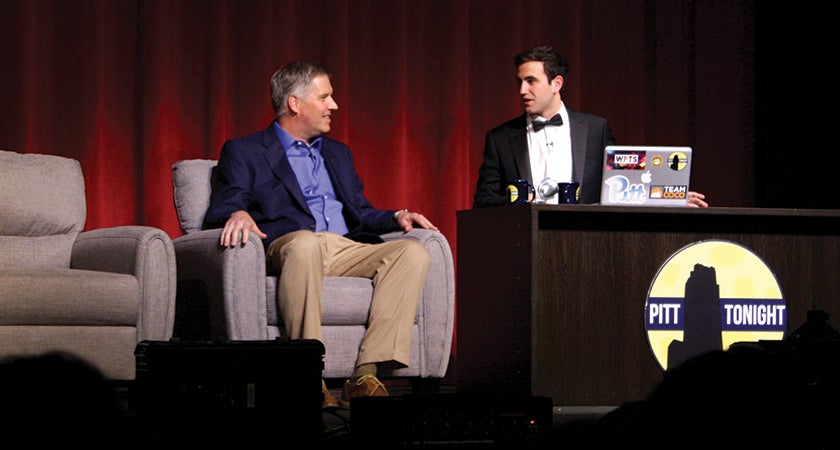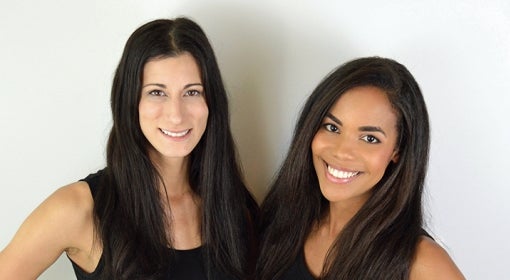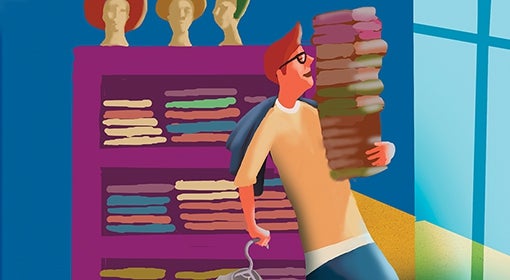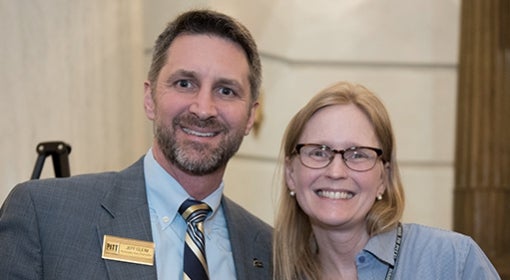When Jesse Irwin walked into Professor Robert Clift’s office in September 2015, he was a kid with a crazy idea.
“I really want to start an on-campus late-night talk show,” Irwin said matter-of-factly.
A late-night talk show? Seriously?
An assistant professor of film studies, Clift was taken aback by the student’s ambitious plan. But instead of saying, “Are you kidding?” he offered to contribute production equipment and otherwise help however he could.
Three months later, a few hours before the first live performance of Pitt Tonight on Dec. 14, 2015, Clift couldn’t believe the high-energy atmosphere when he walked onto the set. Students carrying walkie-talkies. Writers running jokes. A slick logo portraying a moon bisecting the Cathedral of Learning.
But the biggest surprise of all was Irwin himself. As soon as he stepped onto the stage of the Studio Theatre of the Cathedral, he let out a primal scream, his arms helicoptering to the drawn-out notes of the trumpets in the house band. Students in the audience roared back.
Looking dapper in a black suit, Irwin was loose and breezy as he cracked jokes about pre-med majors, the house band—and himself as an improbable late-night show host.
Clift watched the whole thing unfold from the audience. As a documentarian, he had done a film on standup comics and knew what he saw. Irwin had the rare natural timing of a comedian.
What started as a crazy idea quickly became a history-making first at Pitt, with a student turned star. Eleven episodes later, Pitt Tonight is one of the most popular student-run productions anywhere. It quickly attracted 3,500 Facebook followers, and members of the Pitt community line up once a month throughout the academic year to get into the free show, taped live on Sunday evenings and edited for broadcast via the Internet.
Pitt Tonight is more than a cherished campus fixture. It has won national credibility as a finalist for two Emmys from the National Academy of Television Arts & Sciences’ Mid-Atlantic Chapter: for Student Production in the arts and entertainment/cultural affairs division and for Irwin in the Talent category.
On April 15, Irwin stepped onto the stage to host Pitt Tonight’s season finale, leaving behind a legacy that he will pass onto a successor. The 23-year-old is a senior and expects to earn a bachelor’s degree in film studies this summer. Irwin says he wouldn’t have been able to transform himself into a comedy show host without his 70-plus person staff, consisting mostly of students. “They make every aspect of the show twinkle. Without them, I would just be a weird kid standing on stage in the dark.”
That team is a microcosm of the campus. Engineering and creative writing majors hash out jokes in their own writers’ room. Other students book talent, operate cameras, work the teleprompter. Sometimes editors stay up all night to go through hours of footage to put the latest show onto the Pitt Tonight Web site (pitttonight.com).
“Jesse built Pitt Tonight from nothing to something huge and awesome,” says Noah Wilps, a junior film and fiction writing major and staff member of the show. “He brings everyone along with him.”
Jesse being Jesse—something his staff members always say—he didn’t stop at the success of his own show. He became an activist for student-generated media at Pitt by proposing the merger of Pitt Tonight with University of Pittsburgh TV (UPTV). The UPTV station that relaunched this year will be home to six new student-produced shows, including Trying to Make Sketch Happen (a sketch comedy show) and The Bully Pulpit (political think pieces).
“When you have someone pull you up, the best thing you can do is the same for the next person,” Irwin says. “As a student, it’s your job to leave the place you love better than you found it.”
The creation and production of Pitt Tonight helped other students realize they could create decent video content. Irwin has become such an advocate for student-generated media that he uses the hashtag #pittstudentmedia on his Twitter account. “It never caught on. Even now,” he says. His thick dark eyebrows arch up playfully. “People say, ‘Be quiet, Jesse.’”
Like any good late-night host, he knows how to turn his media obsession into a joke about himself.
At the age of one, Irwin already liked to perform. Sitting in a baby seat attached to the dining room table, he would cock his head to the right, then to the left, getting his Mom to pantomime him. Adding another comedic beat, he would repeat the entire routine in double time, and when Mom played her part, baby Jesse would let out a laugh.
“I would always say he could entertain before he could talk,” says his mother Lynn Snyderman.
His natural showmanship was evident in musical theater, where he pranced around an umbrella, a la Gene Kelly, in an elementary school program based on Singin’ in the Rain. By middle school, he played the lead in Footloose and acted in productions of Bye Bye Birdie and Bugsy Malone.
At Taylor Allderdice High School in Squirrel Hill, he dropped out of theater because of teen peer pressure, a decision he still regrets. He threw himself into sports instead.
His mother remembers the day he came home and told her that he was going to be a kicker on the football team. She looked at her scrawny son who hadn’t yet hit a growth spurt. “Do you know how to kick?” she asked.
“I think I can figure it out,” said the teenage Irwin, who then practiced constantly until he got the hang of it. He not only made the high school team but went on to be named an all-city kicker.
The dedication and focus he developed to kick his best in a crucial play gave him the courage to stand on stage and deliver jokes with perfect timing. “I feel a similar adrenaline rush,” he explains.
After high school, Irwin entered Penn State as a broadcast journalism major. Five months later, he was forced to withdraw because of a severe case of Crohn’s disease, an inflammatory bowel condition. He underwent surgery and was hospitalized for two months. His mother recalls: “He was super sick. But by March, he finally came out of the cloud.”
If one positive came out of his illness, it was his transfer to Pitt in fall 2013. “I feel like it was destiny,” he says. Pitt would soon launch a new academic program, a track in Film and Media Production, which combines the critical skills of film analysis with the technical and creative aspects of production. From the start, Irwin was determined to make his mark at Pitt.
His middle school acting skills came in handy when he did play-by-play commentary at basketball and football games. With his breezy manner and sonorous voice, he had the natural
skills of a host for campus events, and he was tapped by University Communications for on-the-scene video feeds of the action during last fall’s White House Frontiers Conference. The event, co-hosted by Pitt and Carnegie Mellon University, featured top national scientists and entrepreneurs, along with then-President Barack Obama.
 Irwin sharpened his journalism skills by doing multimedia work for the Pitt News. Behind the scenes, he was known for throwing out zany ideas and what-if schemes. For April Fool’s Day, he did a segment asking students about their favorite TV show ... then promptly told them it was canceled.
Irwin sharpened his journalism skills by doing multimedia work for the Pitt News. Behind the scenes, he was known for throwing out zany ideas and what-if schemes. For April Fool’s Day, he did a segment asking students about their favorite TV show ... then promptly told them it was canceled.
Irwin was sitting in his apartment on Craft Avenue the night that changed his life—and soon the life of the campus. It was Feb. 17, 2014 when he tuned in to Jimmy Fallon’s debut on The Tonight Show and was charmed by the easy presence of a natural comedian.
Then it hit him. He knew exactly what he should be doing. As the host of a late-night talk show, he could pursue all the things he loved most about lm and media—comedy, politics, and interviewing people for news stories. A lot of college kids might dream about being the next Jimmy Fallon or Conan O’Brien—then they get back to their political science homework or hanging out with friends.
But there’s nothing typical about Irwin’s drive. He called his good friend Mason Lazarcheff, a film studies major, who was used to talking Irwin down from ambitious, sometimes zany ideas. Like the time Irwin proposed a cross country trip, finding a good story in every state. No, Lazarcheff told him. Too expensive. But when Irwin laid out the late-night talk show host idea, Lazarcheff not only thought it was great, but he also offered his help leading the production side of the show.
Hoping to generate interest and formalize it with the University, Irwin started the late-night show as a student club. He drew up a constitution for Pitt Tonight that summer and planned the first meeting for the fall. Lazarcheff remembers watching his friend fidget and work on the logo as he waited to see if anyone actually came. Thirty students showed up for that initial meeting.
Joe Marchi, an engineering major, was among them. Now the 22-year-old is one of three head writers who loves hanging out in the writers’ room, spitballing and refining jokes. “Jesse jives with our writers. We have developed our own voice, which is somewhat absurdist.”
“If you would have told me that Pitt would have a late-night show, which is such a huge undertaking, I don’t think anyone else could have pulled it off but Jesse.”
Gabrielle Sieber, a communications and English major, attended the first meeting fresh off an internship with Jimmy Fallon. “I honestly thought it was destiny. But I didn’t know it would grow so big. Jesse has a natural ability to connect to people. He knows everyone’s name, from freshmen to people who have been there the whole time.”
As the staff worked on the fourth episode, Shannon Kelly, a fiction writing major, walked into a meeting for the first time, not knowing what to expect. Irwin greeted her, asked her name, and told her to take a seat next to him so they could collaborate on a joke. “I had never formatted a joke before,” she said. Even though that first joke didn’t make the show, she was hooked. Her favorite part of the week is going to the two-hour weekend meetings. “If I don’t go, I’m sad,” she says. During a rehearsal for the March episode, Jesse went over jokes for his monologue with writers. The theme tied in with Women’s Empowerment Week on campus. It was a fine line to walk, making jokes about women and then going to a serious subject. “It was hard finding the right balance,” says Irwin.
He cuts out one joke about women in business—“that’s what your grandfather calls secretaries”—because it doesn’t sit well with someone on the staff. “Our humor comes from a good place,” he says. “I would never tell a joke that someone on our staff is uncomfortable with. I would rather give up the monologue than lose someone on our staff.”
Minutes before the show, he rehearses a female-oriented riff on March Madness, pitting prominent women against each other such as Hillary Clinton vs. Condoleezza Rice. His staff tells him to deliver the jokes exuberantly instead of as a straight man.
He is at ease as he interviews the three guests, Pitt professor and jazz pianist Geri Allen; undergraduate Sidney Cannon-Bailey, who does science experiments on stage; and Sydney Harper, a student government officer in charge of Women’s Empowerment Week.
On other shows, he has interviewed everyone from Pitt Chancellor Patrick Gallagher to Ophelia Ferguson, a popular cashier at Market Central, to alumni including Pittsburgh Mayor Bill Peduto and forensic pathologist Cyril Wecht. He doesn’t put on a persona when he is on stage. He’s Jesse, just amped up a little. “That’s why it works,” says Hayley Ulmer, the show’s executive producer. “He’s very genuine.”
The show has also been a springboard for other opportunities. Irwin interned at the Conan O’Brien Show in summer 2016. Recently, he faced his most excruciating decision—picking his successor as the host of Pitt Tonight. It felt a little like interviewing the new boyfriend for an ex-girlfriend.
“It will be weird to have something you have made stand without you,” he says. “I live and breathe Pitt Tonight. A huge chapter in my life is closing.”
Despite the bittersweet feelings of letting go of the show he and his fellow students built from scratch, he knows they have made something that will last. In five or so years, he can foresee alumni of Pitt Tonight working on the Tonight Show Starring Jimmy Fallon, Full Frontal with Samantha Bee, and other late-night TV. As Irwin puts it, “Pitt Tonight will be able to create a community and a pipeline of talent.”
Opening image: Jesse Irwin
This article appeared in the Summer 2017 issue of Pitt Magazine.





